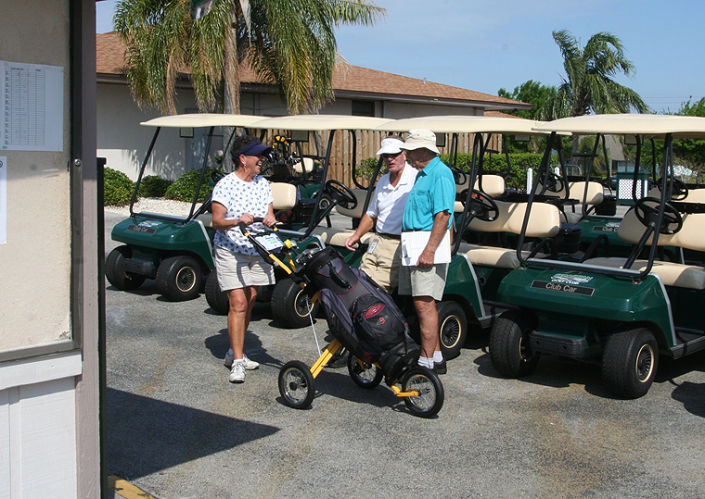
SEBASTIAN — What began as a Sebastian City Council consent agenda item to award a bid on golf carts earlier this month, developed into a bone of contention when a losing bidder argued to get the item dropped from the consent agenda, tabled, re-considered and, possibly rejected entirely.
Of the three bidders, Yamaha, with the lowest bid of $299,050, for 87 electric golf carts and one gas-powered utility cart, which won over E-Z-GO and Club Car. The item was removed from the consent agenda, however, because E-Z-GO senior sales representative Jeff Barrett came before Council to argue against the recommendation.
Barrett asked that the bid not go to Yamaha, contending that consideration of trade-in value would show a $300 differential in favor of E-Z-GO, because Yamaha carts depreciate faster. In addition, he asserted, as stated in the bid package, comparing energy usage among the three bidders would indicate E-Z-GO’s batteries could provide a 31 percent reduction in energy costs.
City Manager Al Minner stood by his recommendation and told Council the city has had a satisfactory relationship with Club Car since the 1980s and had not gone out for competitive bids since that time.
After deciding to seek competitive bids and sending out an initial RFP, it became evident that the request would need to be corrected to more accurately compare “apples to apples,” so the item was rebid, and Yamaha was chosen.
Vice Mayor Don Wright, upon hearing Barrett’s arguments, said he felt the trade-in value and energy issues warranted further study.
Mayor Bob McPartlan said he liked the idea of the 31 percent reduction in energy costs and suggested staff should look into it.
At that point, Council discussed tabling the item and sending it back to staff.
Councilman Jim Hill said he was satisfied with the bid package as presented and that he had confidence in staff.
“We’re making a mess of something that is pretty darn easy,” Hill said.
Minner felt energy usage differences would be negligible, but agreed if E-Z-GO would state in their contract that, if the City’s electric bill did not decrease by 31 percent they would “come up with some money,” he’d recommend tabling the item.
At that point, City Attorney Robert Ginsburg said his recommendation would be to reject the bids, because the electric usage issue was not mentioned in the bid package.
Minner responded that the issue should be tabled, allowing staff time to look further into the matter. If another bidder were found to be the better option, Council could then reject the bids.
Minner said it would be difficult to determine electrical usage of the golf carts alone because there is only one meter for the entire Golf Course complex – the golf course, restaurant and pro shop – and it could cost $50,000 to re-wire in order to break out the cart usage.
Wright removed his motion to reject and instead moved to table, which his fellow council members supported.
Because the City hopes to have the new carts by the time season starts, Minner and staff immediately got to work researching the items in question – trade-in values and electrical savings – and provided a summary of findings.
Staff contacted a cart dealer suggested by E-Z-GO, one suggested by Yamaha and one chosen in-house. All agreed there was negligible trade-in value difference among the three companies. Staff also determined that there is no industry standard for cart re-purchasing as there is with cars.
The same cart dealers agreed that all three companies produced quality carts with no brand holding a “competitive battery advantage,” and that battery replacement costs were the same.
As to measurable electric consumption, a “reputable local electric contractor” was contacted. The contractor estimated cart charging used about 30 percent of total golf course electric consumption.
Separating the cart barn, it was concluded, would cost an estimated $15,000. Considering no baseline exists for comparison in order to measure E-Z-GO’s contention, it was concluded that “the electric consumption avenue does not appear as attractive to determine a better cart purchase.”
After all was said and done, Minner plans to make the same recommendation to Council he had previously, to award the golf cart bid to Yamaha. Council is expected to consider the recommendation at its next regular meeting.
In any case, the additional research may offer a change for the better.
Minner’s summary concluded: “While the electric issue cannot provide a competitive advantage in the cart bid, it may be an avenue that should be investigated. Per our conversation with the same electric contractor, electrically separating the cart barn from the other facilities would (1) upgrade old wiring; and (2) ensure off-demand consumption. These items would lower our electric costs. Perhaps with the savings derived from the lower cart expenses, the funds should be used to offset the electrification enhancements.”



